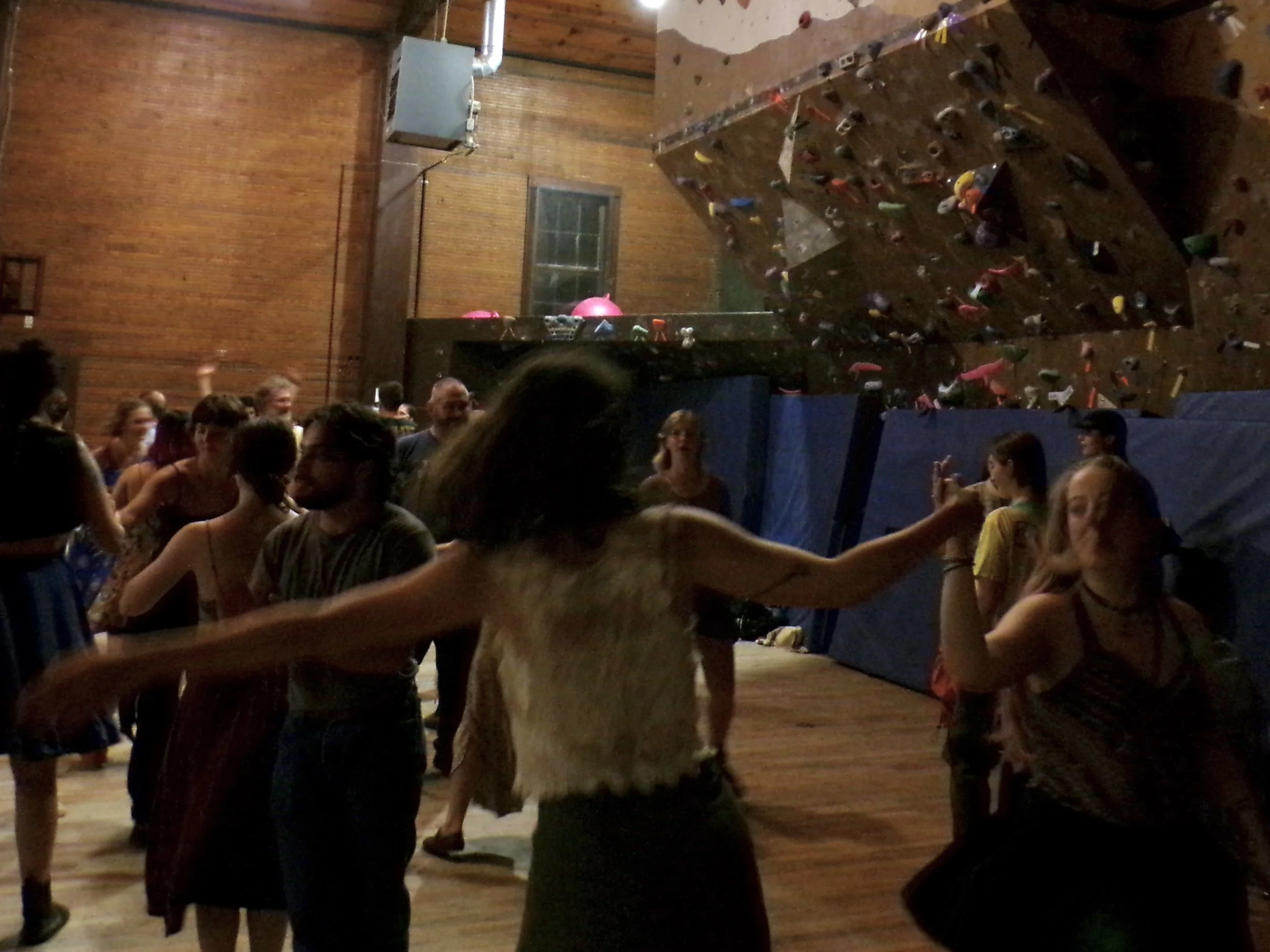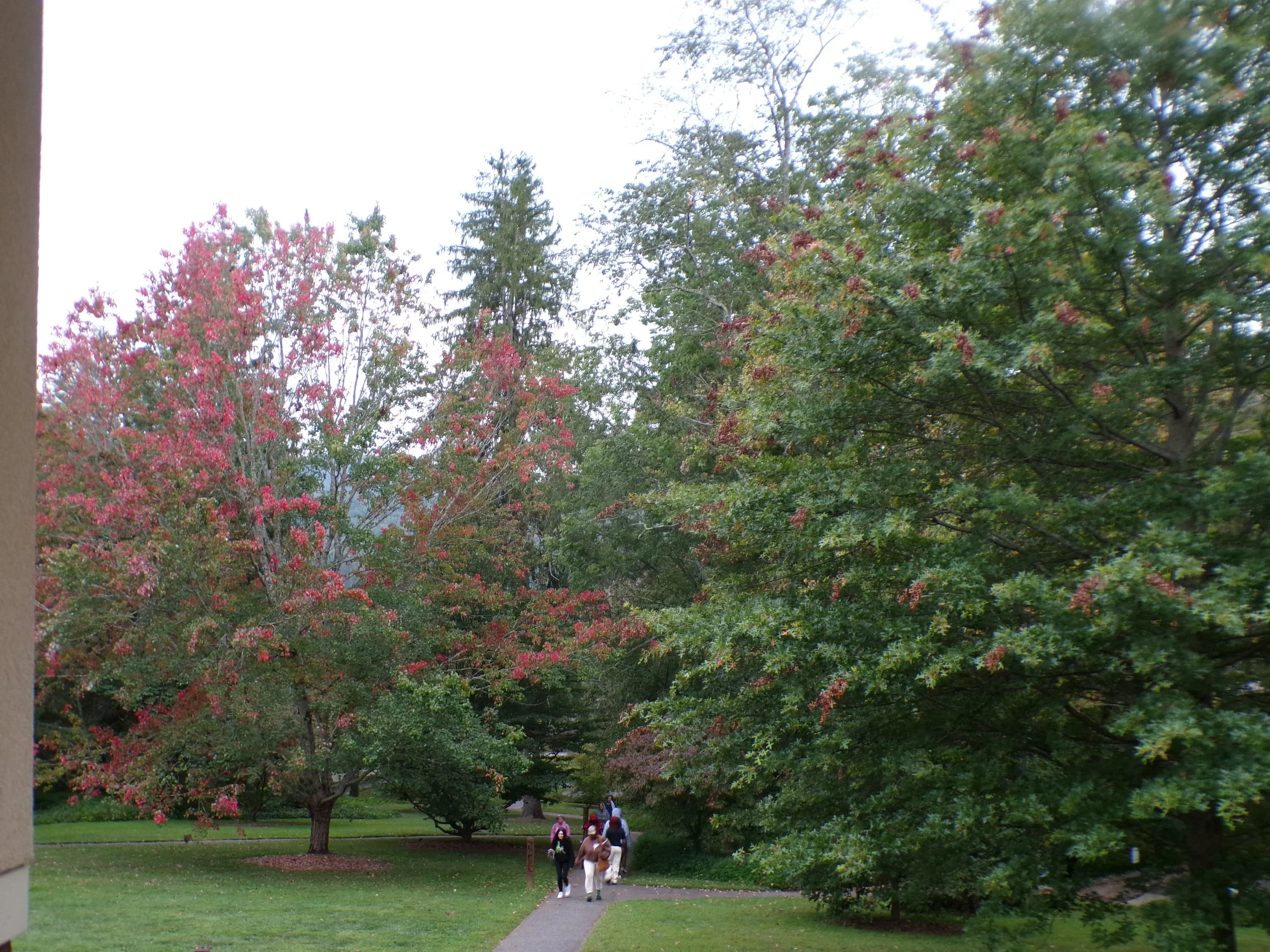Echochamber of Politics On Our Campus
Solie Lawson | September 23, 2025
The Echo sent out a survey to over 700 Warren Wilson College (WWC) students regarding their political affiliations. With only 34 respondents, it may come as no surprise that there were no conservative responses. Although the WWC campus could be described as a progressive echochamber, there is diversity of political opinion at the college.
Out of the 34 respondents, nine identified as Democrats, nine identified with no party, and 16 identified as “Other”. Twenty-four students answered that their values are more left-wing, and all participants answered that they are not happy with our current political climate.
Interviews were conducted with three different students with a range of political thought.
Photo of Contra Night in Bryson Gym by Mallory Wallace-Usry.
Brea Cyphert is a sophomore on the Outdoor Leadership Crew who described herself as liberal. While Cyphert did feel as though she had a community of people with similar political beliefs to hers, there were some differences she noted between her and her party.
“I think that sometimes there’s a bit of competition just to see who can be more liberal- not necessarily at Wilson, but just in general,” Cyphert said. “I think that sometimes people try to compete to be mature and have a liberal mindset, rather than being true to how they’re feeling.”
Cyphert said that she did not agree with the division in the U.S. and explained that she sees the party system as complex. While Cyphert believes that most of the current political conversation is fueled by division and debate, she also recognizes that there are convolutions within each party. She talked about how it is not just one side of a coin and then another side of a coin, and that within each side lies a range of ideas and morals.
Cyphert also spoke about a conversation about abortion that happened during a diversity talk on campus last year. In this talk, an exchange student who held more conservative opinions spoke up, and the conversation became heated.
“When you don't get a lot of exposure to different mindsets, there can be a sense of being threatened,” Cyphert said. “That's not necessarily helpful when you're going out into the real world. I would like to see better facilitation of different perspectives coming together in a way that's like ‘Oh, why do you think that? Can you expand on that?’ More listening.”
The hostile approach to differing ideas may provide a reason why WWC’s campus is lacking in conservative viewpoints. If the division of the country were different, would the campus be more politically diverse? If mindsets were to be like Cyphert’s, would WWCs be more open to having controversial conversations without unproductive arguments?
Photo of back of Sunderland at WWC taken by Mallory Wallace-Usry.
Will Womack, a senior on the Construction Crew, shares a similar distaste for division, but his political affiliations rest elsewhere. He describes himself as a communist and noted that taking some years off from WWC and living in different states has offered him a different political outlook.
Depending on the state Womack lived in, he typically registered as a Democrat, ensuring he could vote in the Democratic primary. He does not identify with the party platform as a whole, claiming distaste for the black and white ideology set within the party.
“I guess I've never really chosen a side, which a lot of people on the Left don't like at all,” Womack said. “They get really upset if you don't say, ‘Well, I'm for state power’. I'm against state power.”
The stifling nature of the Left made Womack prefer to identify as communist, finding a more open perspective within that label. While he finds comfort in communism, his view on the current political state of our world, much like his fellow interviewees, is one of judgement and an awareness of a lack of benefit for the American people. He particularly dislikes the current uproar of capitalism.
“The capitalists who are destroying the planet use fear and intimidation against different forces of oppression and patriarchy to sustain their power,” Womack said. “That's my most pressing political perspective.”
Womack, who is 35, describes the student body at WWC as more open than his generation. He stated that the current generation at Wilson has a broader outlook on politics as a whole and that they are more radical than previous generations.
“Being 15 years older than everybody, I'm a little bit removed,” Womack said. “I do have friends and I do make conversation, but I don't think I really get to know y'all as well as y'all know each other. In general, Wilson students seem to be passionate and dedicated to issues like equity and justice. I think this is probably one of the best places to be, certainly in the South, if not in the country.”
Womack views WWC’s campus as safe, open and politically aware. This view is different from Cyphert’s perspective that WWC needs a more open environment. Both their opinions on the state of our world are similar, despite their contradicting desires for the political climate at WWC. Underlying these differences of opinion, however, is a feeling that the scope of politics needs to change. This similarity in belief could reinforce the idea that WWC is, in fact, a progressive echochamber.
Photo of Contra Night in Bryson Gym by Mallory Wallace-Usry.
Banks Gerowin, a sophomore on Cowpie Crew, identifies as a Democrat. He noted that his parents have heavily influenced his political perspective. Gerowin expressed concern over the instability of the current political climate.
“Parties are a really broad coalition, and I think everything's being held by chicken wire at the moment,” Gerowin said.
Though his own political beliefs align with the Democratic Party, Gerowin still has some open-mindedness. He believes that the majority of students at WWC share similar political beliefs.
“This is totally an echo chamber,” Gerowin said. “I'm oftentimes not getting challenged [in] my beliefs.”
Although the WWC community has not challenged his political beliefs, he recommends the political philosophy class he took to those who want more knowledge on politics globally and a broader political perspective.
While some political perspectives across campus differ, most share the belief in an overarching need for change and unity, not just across campus, but globally. All interviewees have found community in their different schools of thought, and have found little challenge to these beliefs in the WWC community. Each interviewee expressed similar concerns, such as the deep division the U.S. has found itself in. While Cyphert highlighted the need for more attentive listening in her party, Womack shared the radical mindset that he shares with the community and how he has felt safe and welcomed at WWC. Gerowins maintained a similar viewpoint of advocating for change in the messy political climate of the U.S.. These perspectives raise the question: Is the progressive echo chamber the community has found itself in truly productive for the growth of inclusivity that WWC promotes?




